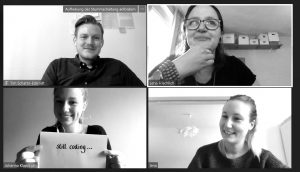6/6 – DemoRESILdigital at the #ICA21
The junior research group will be part of this year’s “Annual International Communication Conference” (ICA21): With five accepted papers and one talk in a panel organized together with Edda Humprecht from the university of Zurich (out of six submissions; see list of submissions below), Lena Frischlich, Lena Clever and Tim Schatto-Eckrodt will provide various insights into their research. The International Communication Association (ICA) is an international academic association related to communication and mass media with more than 6000 members in over 80 countries. Its flagship event is the annual conference, which will be held as a virtual conference in 2021 due to the Covid-19 pandemic.
List of submissions:
- Frischlich, L., Klapproth, J.K., Kleineidam, T. & Schatto-Eckrodt, T. (2021, May). Entertained by Extremists— Staging and Effects of Eudaimonic Instagram Propaganda. Paper to be presented at the 71st Annual Conference of the ICA, Virtual Conference (originally to be held in Denver, CO, USA).
- Frischlich, L, Hellmann, J., Brinkschulte, F., Becker, M. & Back, M, (2021, May). Sowing distrust on a fertile ground – How distorted alternative news fuel negative attitudes towards political candidates amongst susceptible recipients. Paper to be presented at the 71st Annual Conference of the ICA, Virtual Conference (originally to be held in Denver, CO, USA).
- Frischlich, L., Schatto-Eckrodt, T., Kuhfeldt, L, & Clever, L. (2021, May). Fueling the information disorder? Alternative news media in the COVID-19 crisis. Paper to be presented at the 71st Annual Conference of the ICA, Virtual Conference (originally to be held in Denver, CO, USA).
- Humprecht, E., & Frischlich, L. (2021, May). Spirals of Distrust: Vulnerabilities to Disinformation Across Countries, Citizens, and Time. Panel to be presented at the 71st Annual Conference of the ICA, Virtual Conference (originally to be held in Denver, CO, USA).
- Schatto-Eckrodt, T., Clever, L. & Frischlich, L. (2021, May). The seed of doubt: The role of alternative and established news media in the early moments of a new conspiracy theory. Paper to be presented at the 71st Annual Conference of the ICA, Virtual Conference (originally to be held in Denver, CO, USA).
- Wintterlin, F., Schatto-Eckrodt, T., Frischlich, L., Boberg, S., Reer, F., & Quandt, T. (2021, May). Why do people spread distorted information online? An examination of predictors based on the theory of collective action. Paper to be presented at the 71st Annual Conference of the ICA, Virtual Conference (originally to be held in Denver, CO, USA)


